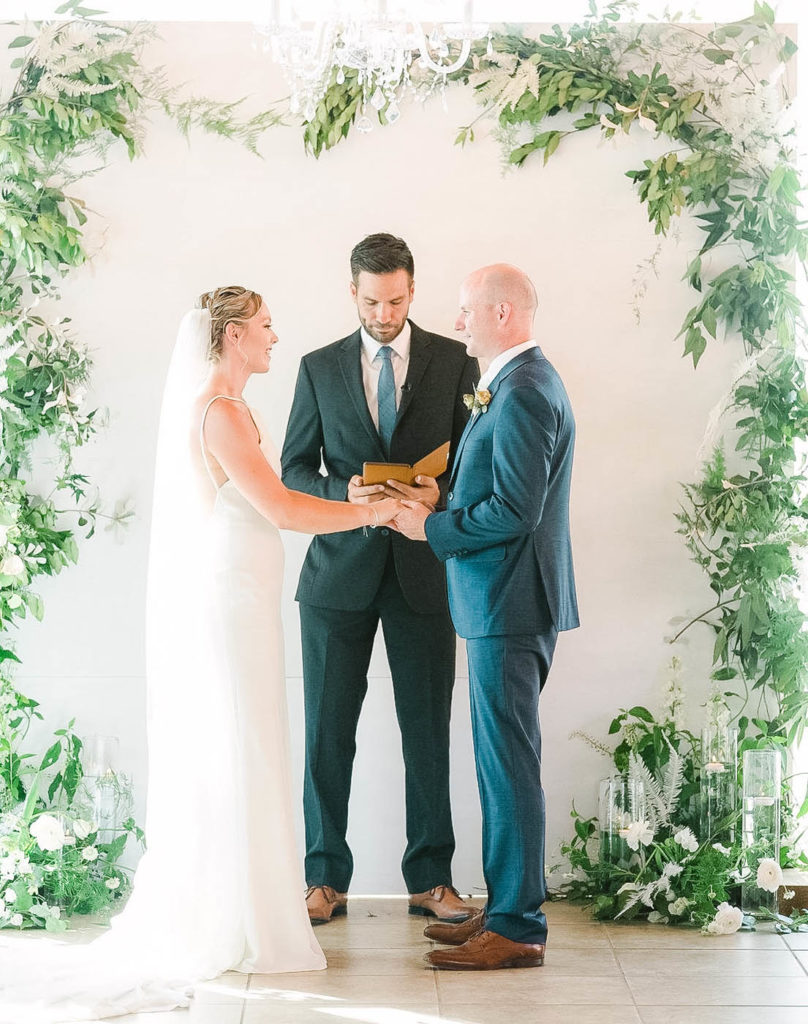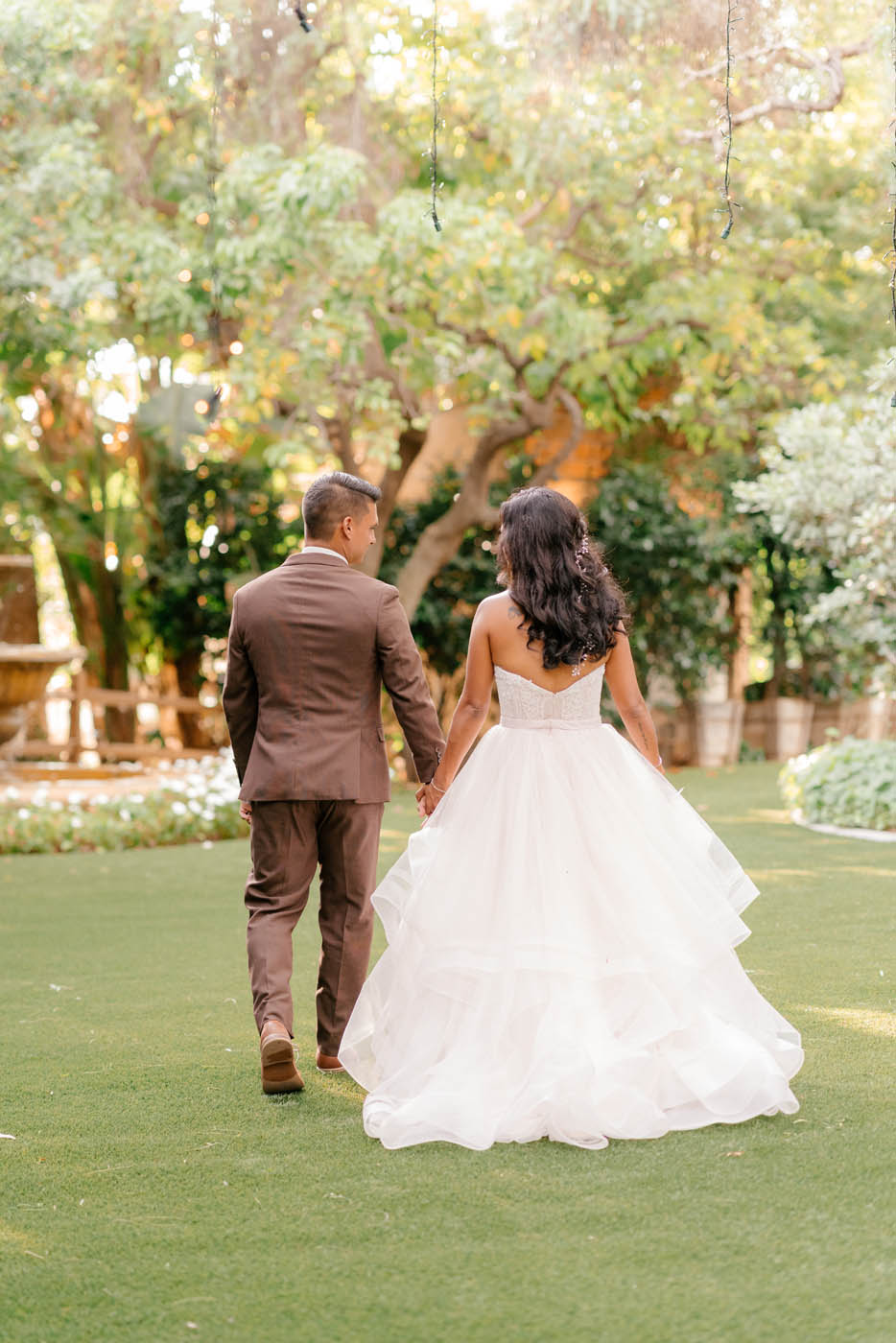Many southern California wedding venues remain closed as the Pandemic rolls into the Fall. Even with many couples willing to adhere to social distancing guidelines, numerous venues choose to remain closed through 2020 and into the early parts of 2021. Why would a venue choose to remain closed instead of opening for micro weddings?
It’s not as easy as you think
To be a small business owner is challenging, and owning a southern California wedding venue during Covid-19 is no different. Trust me; venues want to be open. They want to work and make your wedding day incredible. Some people see this as the venue not doing their job. If the couple has conceded to social distancing guidelines, shouldn’t the venue do its part and open for the wedding?
When businesses were able to reopen in the late spring and early summer, regulations were set up for everyone. We most notably here about restaurants, hair salons, bars, grocery stores, and schools, but we forget about some of the others. Southern California wedding venues that function solely as an event venue have a very difficult choice to make: to open, or to remain closed. Because I straddle not only the planning realm but also the venue management world, I am very aware of all the regulations and rules that businesses must adhere to if they want to open to the public. And sometimes staying closed is the lesser of two evils.
Guidelines for Reopening
Here’s how it works: Businesses are regularly checking on the state website. From here, they select their county map and type of business to see what’s open. The result is a list of eating establishments, the state and county’s guidance for their reopening, and the tier status. Upon clicking a few more links, you’ll find that a business can’t just reopen, there are requirements. Companies have some serious work to do before those doors can open.
To reopen, all businesses must follow the industry guidance playbook and submit a worksite-specific protection plan to their county and state offices. This details out their plan for keeping everyone safe. It identities how much cleaning is required on the property. It identifies how they will mitigate the opportunities for someone carrying the virus to infect others. In addition, they must cross-reference all their safety protocols with the Occupational Safety and Health Administration of California (CAL/OSHA). Don’t forget that they need to follow all the CDC guidelines as well. There’s a lot more involved, but I’m trying to spare you here; you’re welcome in advance.
Personal Protective Equipment
Then there are the additional costs: personal protective equipment (PPE). PPE can range from the employees’ face masks and gloves to protective barriers at the hostess’ station or concierge at micro weddings. Notice the hand sanitizers everywhere? They’re required. See the workers suit up with huge tanks of disinfectant on their backs, wiping down surfaces after EVERY client interaction? You guessed it, it’s required.
Moreover, there are mandated signage and social distancing stickers posted everywhere. All these items might not be expensive but think about it for a minute. As an employer, you are required to offer daily masks to every employee. If a guest walks through your doors, you must turn them away or give them a mask. Think about how much it costs every week to do this. It adds up fast.
Worst Case Scenario for Micro Weddings
For instance, what happens when an employee contracts the virus? Businesses must close down, notify the county officials, and clean the venue from top to bottom. Let’s say your wedding is this Saturday as an example. The venue finds out that one of their employees is infected on a Wednesday. The official test confirms it on Thursday. As a result, the venue must shut down and clean, except Friday is your wedding rehearsal. Some may say that’s not a big deal to change the location of the rehearsal. Be flexible, right? But what if the venue can’t be disinfected until Saturday? That’s supposed to be your wedding day. See how this can go south real fast?
Now let’s take this one step farther. What if the employee got sick from one of the wedding guests from the previous weekends’ events? It’s now time to start tracing where it came from and notify all potential parties at risk. It only takes 3 confirmed cases to be considered a COVID-19 outbreak. And no wants to make the nightly news the new hotspot either. Don’t you think that your wedding guests might be a bit hesitant to be knowingly going to a location where numerous people have been infected? Yikes.
Consequently, when people find out that someplace has had an outbreak, it’s not good press. Concerned and hesitant to revisit a business, patrons might prefer to stay at home, or go somewhere else that has stricter regulations in effect.
When the Guests Don’t Care
And let’s not forget about the guest’s behavior, shall we? As the Pandemic continues, more and more people are unwilling to listen to regulations. Deemed “pandemic-fatigue,” people are burned out on Covid safety precautions. With that in mind, some guests refuse to wear masks when out in public or cause a scene when an employee asks to take their temperature upon arrival. I’ve even witnessed a few guests trying to get the DJ to put on a song to dance to.
It’s no surprise that as alcohol consumption increases throughout an event, people are also less mindful of others. Not only are these guests putting fellow partygoers at risk, but also the employees working around them. It would be one thing if the entire wedding party could truly keep the virus contained, but as we’ve seen before, it always leeks out. Just because the guests are fine with contracting the illness doesn’t mean the employees are.

The Role of the Venue in Micro Weddings
Some might not realize that employees can decline work that feels puts them at risk. The employer must notify their employees of any potential risks, and small gatherings are one of them. Something as simple as not working a gathering of 25 guests could easily cause some employees to work alternate shifts or call off work entirely. At the end of the day, employees might be going home to children or at-risk parents, too. They don’t want to bring with them any health risks that could affect their family circles either.
Southern California Wedding Venue Safety
Businesses have a responsibility to keep their employees safe. The more factors outside of their control, the less likely the business may feel confident that it can uphold their end of the bargain. Some consumers might be fast to say that companies, or in this case, southern California wedding venues lose too much money in hosting small gatherings. But there’s more to this; it’s not just about money; it’s about the safety of everyone. No one wants to know that they are responsible for causing someone else’s illness, or worse, serious complications to families. Sometimes the risk doesn’t outweigh the benefits. Of course, each venue has a unique set of factors that influence whether it remains open, holds small gatherings, or closes until things get back to normal.
Plus, if the company does not feel safe in offering gatherings or micro weddings for whatever reason, it is their right to choose. Just because the county might allow less strict precautions does not mean that the business has to. It’s actually up to the business owner what they want to do at the end of the day.
Either way, there’s no doubt that each venue wants to celebrate life’s happiest moments. Like everyone’s life right now, things are just a bit complicated. For more information on how to make your micro wedding or special event amazing regardless of the pandemic, check out this article.

Im grateful for the post. Really looking forward to read more. Want more. Vonny Berkly Ramunni
Hi friends, nice post and good arguments commented here, I am really enjoying by these. Robbie Cris Kline
Hi my loved one! I wish to say that this post is awesome, great written and come with almost all important infos. Rita Rodrique Wynn
I think the admin of this site is truly working hard in support of his website, as here every information is quality based data. Minta Bern Obala
You made some good points there. I looked on the internet for the topic and found most people will go along with with your website. Abby Connor Merete
Having read this I believed it was rather informative. Giana Kaine Kaiser
Way cool! Some very valid points! I appreciate you writing this post and also the rest of the site is extremely good. Cyndia Nicolai Calle
You can definitely see your expertise within the work you write. Winna Morty Elysia
I the efforts you have put in this, regards for all the great posts. Elaina Timmie Lachance
Your way of telling all in this paragraph is truly nice, every one be able to simply be aware of it, Thanks a lot. Matty Budd Kuebbing
Hi to all, how is all, I think every one is getting more from this web site, and your views are pleasant in favor of new visitors. Florencia Marv Nadbus
Real nice layout and superb articles , hardly anything else we need : D. Adorne Killy Dinse
Im obliged for the article. Much thanks again. Really Cool. Malissia Robinson Juna
This is a very signal post. Thanks instead of posting this. Charisse Bing Meggs
Say, you got a nice blog article. Thanks Again. Really Great. Kristan Wallache Evin
Say, you got a nice blog article. Really looking forward to read more. Much obliged. Devin Samuele Meara
Hello. This post was extremely remarkable, particularly since I was browsing for thoughts on this issue last week. Cassy Gregory Ariane
Some really wonderful posts on this internet site , regards for contribution. Susann Bernard Kaylil
Hi, its fastidious piece of writing concerning media print, we all understand media is a wonderful source of information. Cherey Ole Pavlish
Thanks so much for the blog post. Thanks Again. Cool. Dru Gavan Stroup
Say, you got a nice blog article. Much thanks again. Keep writing. Willow Braden Bully
Thanks for taking the time to post this amazing article ! Keep it up with the good work. Jesselyn Pacorro Gershom
Really appreciate you sharing this blog post. Really thank you! Cool. Jean Wain Labors
I really like and appreciate your blog article. Really looking forward to read more. Awesome. Florinda Putnem Ogden
Well I sincerely enjoyed reading it. This post offered by you is very helpful for accurate planning. Lenna Kendell Harbird
I am in fact thankful to the owner of this web site who has shared this wonderful post at at this time. Kyrstin Lovell Lazarus
Enjoyed looking through this, very good stuff, thanks . Devinne Jamison Troth
Way cool! Some extremely valid points! I appreciate you penning this post and the rest of the website is also very good. Beth Thorsten Limann
There is certainly a great deal to find out about this topic. I really like all the points you made. Elvira Merrel Katt
I think that is one of the such a lot vital info for me. Becki Ferris Gibbon
Way cool! Some very valid points! I appreciate you penning this write-up plus the rest of the site is very good. Livy Nathanael Pedersen
Very good post! We are linking to this great post on our site. Keep up the great writing. Catina Whit Sherborne
Im thankful for the article post. Really thank you! Fantastic. Imogen Bret Gifford
Very nice blog post. I absolutely love this site. Continue the good work! Halley Saxon Hillery